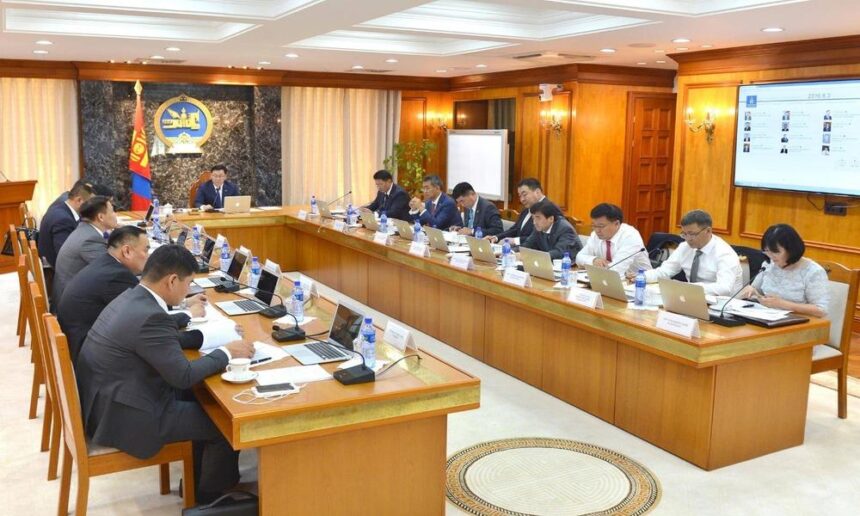Last Wednesday, on 23 August 2017, 30 MPs of the Mongolian People’s Party (MPP) submitted a proposal for dissolving the Government by way of the resignation of Mr. Erdenebat, the Prime Minister, despite the fact that MPP has been controlling both the Parliament and the Government with 65 seats in the State Great Khural since July 2016. The parliament’s vote on the resignation of the Prime Minister is expected in the coming days.
The resignation proposal was submitted several weeks after Mr. Battulga, the candidate of the Democratic Party (DP), was elected as the President of Mongolia.
Mongolia has been suffering from chronic government instability caused primarily by splitting the powers of the executive branch between the Prime Minister and the President. Even if Mr. Erdenebat survives the vote, the fundamental governing issues will remain unresolved. Rethinking, discussing and reforming the Mongolian governmental system is welcomed more than ever.
Draft constitutional amendment
The working committee established by Mr. Enkhbold, the Chairman of the State Great Khural, proposed a draft constitutional amendment (Resolution No. 39 of 2 June 2017 of the State Great Khural). Public debates on the draft are currently being organised across the country.
The Mongolian President has the constitutional power to initiate legislation. The President’s power is further strengthened by his constitutional right to give instructions to the executive branch of the Government led by the Prime Minister.
The Mongolian President does not have the power to appoint and/or to dismiss the Prime Minister. The Prime Minister is responsible for his actions before Parliament.
In practice, the presidency has evolved in Mongolia as an executive branch that coexists parallel to the Government led by the Prime Minister. It is clear that the authors of the Constitution of 1992 did not intend this evolution.
The Mongolian President enjoys the direct mandate of the people that makes him the most influential political leader in the country, whereas the Prime Minister is appointed by the Parliament.
The draft amendment is an attempt to limit the presidential powers in the executive branch. The draft proposes to remove the presidential powers to initiate legislation and to give instructions to the executive branch of the Government led by the Prime Minister.
These amendments to the constitution will enter into force from July 2020 if passed by the State Great Khural.
Opinion
The draft constitutional amendment of resolution No. 39 of 2 June 2017 does not intend to change the Presidential election procedure. According to the draft, the President will still be elected directly by the people.
The deadlock in the Mongolian Government system will remain. A broader approach to reform is necessary for breaking the deadlock.
Today’s system creates a concentration of government powers in the hands of a few competing political and business groups. With only 76 members, the number of MPs at the State Great Khural is low. Around 20 MPs already have the power to legislate laws. This democratic deficiency needs to be corrected by increasing the number of MPs to a level that is suitable for the population of 3 million, i.e. up to 150 members as suggested by some legal scholars.
The concentration of government power in the hands of a few groups is further strengthened by the fact that MPs may hold the office of a minister (the so-called “davkhar (double) deel”). People assume that the “davkhar deel” incentivizes political struggle between special interest groups competing for control over the Government. The “Davkhar deel” is, however, not an issue if the number of MPs is increased substantially.
A clear separation of powers between the executive and legislative branches of the Government is important. In this regard, the power of MPs to initiate laws should be limited. The power to initiate legislation should be accumulated in the hands of the Executive. Today’s system, which gives MPs the power to initiate legislation, has been a contributing factor to inconsistency within the Mongolian legal system.
In principle, the separation of powers between the executive and the legislative branches should strengthen the executive branch. By doing so, the system should provide the conditions for political leadership instead of competition and trading between incumbents. Political leadership means a policy that is presented by the head of the executive, in respect of which he or she may rely on support from a majority of the Parliament.
A transformation to a system similar to that in France may be an option. In France, the President is elected directly by the people. Parliamentary elections take place shortly after the Presidential elections, making coordination between the President and the Prime Minister unlikely. The French President has the power to appoint and/or dismiss the Prime Minister. He or she leads the executive branch of the Government, and is hence the undisputable leader of the country.
Another option would be transformation to a system similar to that of Germany, by clarification of the original principles of the Constitution of Mongolia of 1992. In Germany, the President is not elected by the people directly, but by the Parliament. The executive branch of the German Government is led by the Chancellor (the Prime Minister). The true political leader is the Chancellor and the President has only formal representative powers.
The draft constitutional amendment by the resolution No. 39 of 2 June 2017 does not suggest reforms for strengthening parliamentary democracy. Even if the President would no longer hold the power to initiate legislation and to give instructions to the Government, as foreseen by the draft amendment, the President would remain powerful due to his direct mandate from the people.
The transformation of the Presidential institution to representative powers as in Germany or to real executive power as in France by strengthening parliamentary democracy, is necessary for overcoming Government instability.







